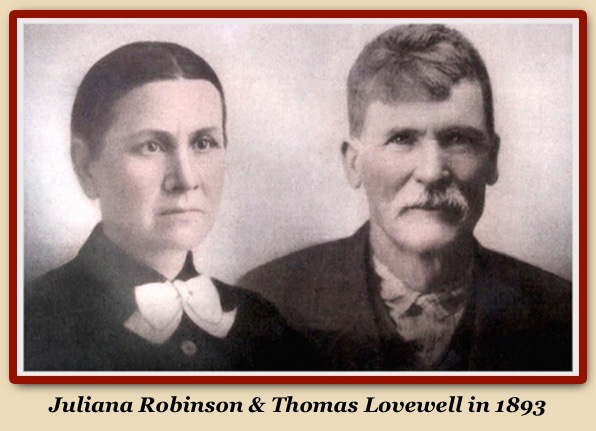I mentioned last time that on at least one point, Lovewell family history may have confused Thomas Lovewell’s daughter Juliana, born in 1857, with Adaline, born in 1872. Gloria Lovewell’s “The Lovewell Family” names consumption as the cause of death for Juliana, who actually died of cancer in 1894. While the book remains silent concerning what ailment claimed the life of Adaline, her descendants believe this young woman really did suffer from consumption before dying in 1903 at the age of 30. Quite apart from the fact that both women died young, it turns out that some confusion between the two daughters was inevitable, even though they were born to different mothers fifteen years apart.

For one thing, according to Rhoda Lovewell’s new book, “The Lovewell Family Revisited,” Juliana’s middle name was “Adaline,” no doubt selected for both girls because it had been the middle name of Thomas’s fondly-remembered mother Elizabeth “Betsey” (Watkins) Lovewell, who passed away when Thomas was a footloose teenager making a living on the Mississippi as a steamboat roustabout.
Both daughters were married to railroad men. Juliana’s husband Edward McCaul was a bridge carpenter for the Missouri Pacific. Even John Robinson, the man with whom Juliana had an unofficial partnership and a daughter, was a locomotive engineer in Nebraska in the 1880’s, a career he picked up again at Lovewell in 1895. As detailed in the previous installment, Adaline Lovewell married the Lovewell depot agent in 1889, a marriage that seemed to get off to a rocky start even before the family moved on to Dodge City, where Thomas C. Smith became the Rock Island agent and depot telegrapher.
Both women’s husbands suffered career-related ruin. Edward McCaul was crippled by a fall while working on the St. Louis depot, succumbing to pneumonia at a railroad hospital a few weeks before his widow died of cancer at Lovewell. As we’ve seen, T. C. Smith’s inability to keep his fingers out of the Rock Island cash box earned him a stretch in Lansing. The fall of Edward McCaul and the downfall of T. C. Smith probably came only two years apart, landing a one-two punch on Thomas Lovewell’s wallet.
At the start of their golden years Thomas and Orel Jane Lovewell suddenly found themselves with grown children to support and youngsters to rear, just as economic depression seized the entire country. The 1895 Kansas census lists Juliana’s daughters Lilly and Alice as members of the Lovewell household, while the McCaul boys stayed at John Robinson’s cottage, the home in Lovewell where Thomas had installed his daughter and grandchildren when he brought them to Lovewell from St. Louis in 1893. Following Adaline’s death, the census periodically finds her boy Augustus or “Gus” bunking at the Lovewell home. According to Rhoda Lovewell, local school records name Orel Jane Lovewell as guardian of Adaline’s daughter Wynetta.
Not only did all of this misfortune play out during a nation-wide economic crisis, but it commenced hard on the heels of the failure of the Citizens State Bank of Courtland, which tied up $1,200 of Thomas Lovewell’s funds for years. The family turmoil must have taken a toll in other ways, as well. In happier times, the Republic City News commented on Lovewell’s youthful appearance during a soldiers’ reunion held at Hardy, Nebraska, 1892.
Tom Lovewell was an active participant in the Hardy reunion. Mr. Lovewell is a firm G. A. R. man, a staunch Republican who has done much for the party in the early days of Kansas. We were surprised when he told us he was over 67 years of age - we should have guessed his age at least ten years less. The News hopes he may enjoy many years more of the good will of his acquaintances which he so bountifully enjoys.
Barely three years later, when he made a stop at Courtland on his way to pay taxes on the old farm at White Rock, the Scandia Journal reported that “time is weighing heavily upon him.” The editor was surprised to see so much gray in the pioneer’s locks and thought he walked with a faltering step. It must have come as a surprise that in 1899 Thomas still had the energy to answer Alaska’s call to go in search of adventure and gold.
By the end of the decade Thomas Lovewell must have needed an infusion of both. After a year in the frozen north he would at least come away with tales of adventure.